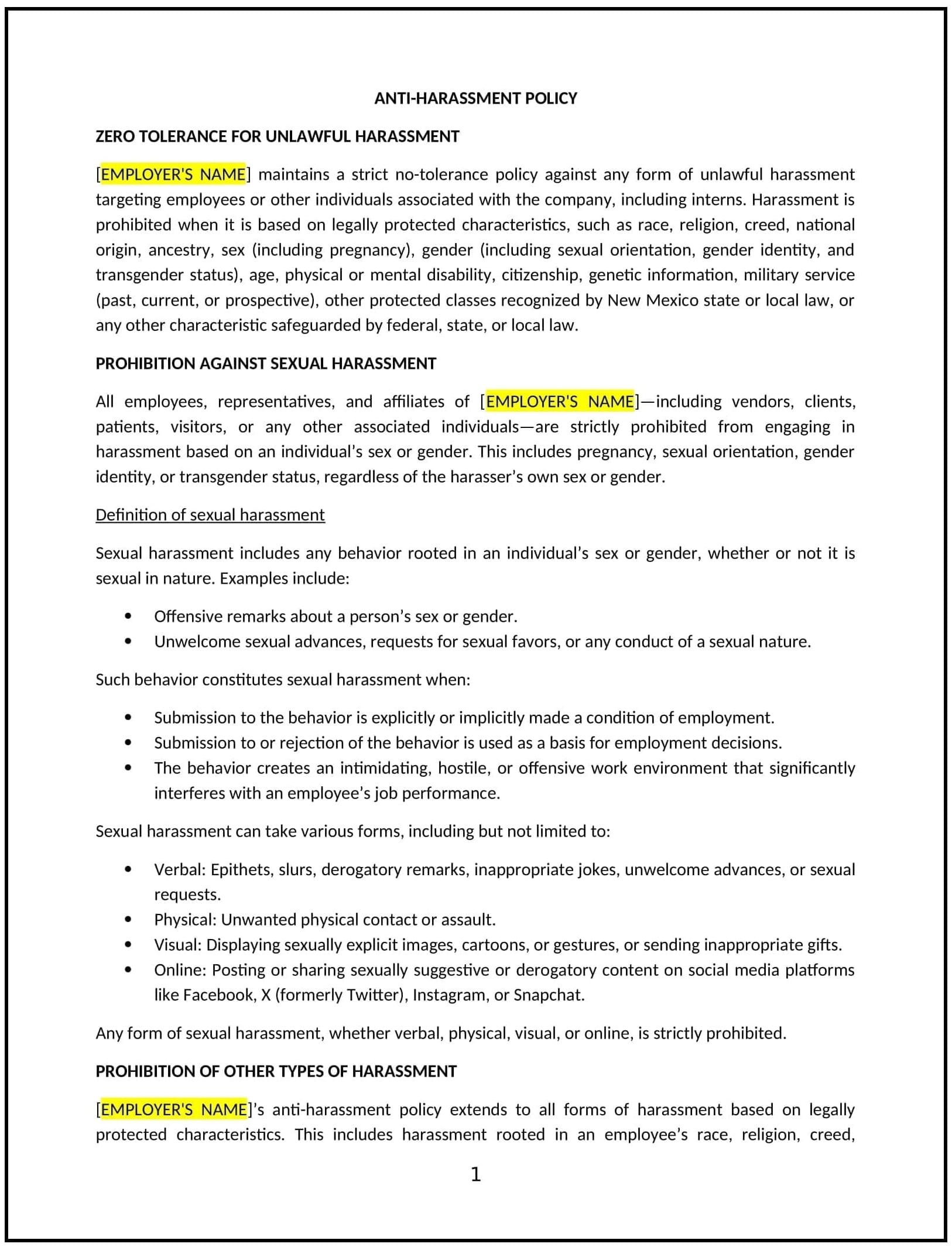Anti-retaliation policy (New Mexico): Free template
Got contracts to review? While you're here for policies, let Cobrief make contract review effortless—start your free review now.

Customize this template for free
Anti-retaliation policy (New Mexico)
This anti-retaliation policy is designed to help New Mexico businesses protect employees who report wrongdoing or participate in investigations from retaliation. The policy outlines what constitutes retaliation, how employees can report concerns, and the steps the business will take to prevent retaliatory actions and address violations.
By adopting this policy, New Mexico businesses can foster a safe and fair work environment, promote ethical behavior, and reduce the risk of legal claims related to retaliation.
How to use this anti-retaliation policy (New Mexico)
- Define retaliation: Clearly explain what constitutes retaliation, including adverse actions taken against an employee for reporting misconduct, participating in investigations, or exercising their rights under New Mexico state law.
- Set reporting procedures: Provide clear steps for employees to report retaliation, including who to contact and the methods available (e.g., HR, a dedicated hotline, or anonymous reporting systems).
- Establish investigation protocols: Outline the steps the business will take when investigating reports of retaliation, ensuring confidentiality and fairness throughout the process.
- Specify corrective actions: Identify potential consequences for retaliation, including disciplinary measures against employees or managers found guilty of retaliatory behavior.
- Address New Mexico-specific considerations: Ensure the policy aligns with New Mexico state laws related to retaliation, including the New Mexico Human Rights Act, which protects employees from retaliation for filing complaints or participating in investigations.
Benefits of using this anti-retaliation policy (New Mexico)
Implementing this policy provides New Mexico businesses with several advantages:
- Promotes ethical behavior: Protects employees who report wrongdoing or participate in investigations, encouraging transparency and accountability within the workplace.
- Fosters trust: Demonstrates that the business values fair treatment and will not tolerate retaliation, helping to build trust and loyalty among employees.
- Reduces legal risks: By preventing retaliation, businesses can minimize the risk of discrimination lawsuits, retaliation claims, or other legal consequences under New Mexico labor laws.
- Enhances workplace morale: Employees feel safer reporting issues and concerns, knowing they will not face retaliation for doing so, leading to a more positive and productive workplace environment.
- Aligns with state regulations: Ensures that the business complies with New Mexico’s legal protections against retaliation, promoting a lawful and respectful workplace.
Tips for using this anti-retaliation policy (New Mexico)
- Communicate the policy clearly: Ensure all employees are aware of the policy during onboarding, and provide regular reminders to reinforce the importance of reporting concerns without fear of retaliation.
- Provide multiple reporting channels: Offer various methods for employees to report retaliation, including in-person meetings, anonymous options, and dedicated contact points such as HR or an external hotline.
- Train managers: Ensure all managers understand the policy and their role in protecting employees from retaliation. They should be trained on recognizing potential retaliation and addressing it appropriately.
- Monitor the work environment: Actively monitor for signs of retaliation or a culture of fear, and address issues promptly to maintain a safe and supportive work environment.
- Review regularly: Periodically review the policy to ensure it remains relevant and aligned with New Mexico state laws or any changes in workplace practices.